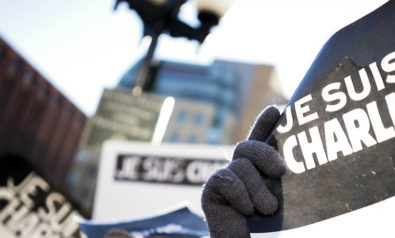Like science and music, religion is a complex human artifact with interesting links to a universe we are all trying to understand. Peter Isackson writes an open letter to Atul Singh, the founder, CEO and editor-in-chief of Fair Observer.
Dear Atul,
I read your recent article in Fair Observer, “Religion is Just Morality Tales For Grown-Ups.” Thank you for a stimulating, wide-ranging reflection on the world’s obviously most insoluble problem (well, alongside the general impoverishment of humanity under the benevolent rule of the 1%, the imminent death of the oceans, the planet, etc). You’ve painted an excellent tableau of key historical facts, though I do take issue with some of the particulars. So let’s start with what I would call the mistaken approximations:
1) “Charlie Hebdo represented the best of the French tradition.”
I’ve been living in France since the 1970s, and I can say for a fact that Charlie Hebdo is not only not the “best,” but that Charlie Hebdo’s team wouldn’t have claimed as much.
In the 70s, Charlie had a role to play, but it became obsolete over the intervening decades, which explains the magazine’s extreme marginality. Delfeil de Ton (Henri Roussel), who was the best of the founding team and drifted away to the Nouvel Observateur because of his talent, has given the best assessment of what Charlie Hebdo had become under Stéphane Charbonnier. He blames Charb for assassinating the team through his pig-headedness (he called him a “tête de lard”).
As your article is about religious beliefs, please be aware of the trend, encouraged by the French government, to attribute sanctity to Charlie Hebdo and integrate it into the state religion. I totally agree with your point about Adolf Hitler’s ambition to rule through an invented religion, but as Thomas Mann pointed out in a late essay in which he provocatively claimed Hitler had won the war, the Nazi regime provided a model of nation-state government that the United States quickly adapted to its own national religion.
The French call the process in which establishments integrate dissident figures into their canon of heroes and martyrs “récupération.” The US transformed its most dangerous dissident of the 1960s into a pillar of the establishment, a public icon and patriot with his own day of celebration: Martin Luther King, Jr. The irony of ennobling an acerbic and uncompromising critic of the system is further highlighted by the fact that MLK Day has been turned into a non-stop National Basketball Association (NBA) television broadcast, presumably because the NBA has an employment policy favorable to African Americans. The message is comforting for the establishment that King challenged, because it usefully reminds us that there are ways blacks can become millionaires and public celebrities — realizing the American dream for themselves as individuals — without threatening the existing power structure.
What would King think of the way he is commemorated? He was the first public figure with moral (if not political) authority to specifically denounce American militaristic imperialism. Then, as everyone knows, he was conveniently killed and turned into an icon of positive black behavior: yes, you can complain and maybe even march in the street, but no violence please. Don’t worry, as soon as we get your message, we in the Beltway and on Wall Street will set things right, and you black folk will always have a chance to succeed, like everyone else. Hey, one of you might even become president one day! (“Get to work on that one, marketing boys! That should keep them quiet for a good long time.”)
2) “Bruno held opinions contrary to the Catholic faith and, therefore, deserved death.”
That is factually true, but logically false as well as factually misleading. Bruno wasn’t condemned for his science, which in fact was pure speculation based on no available evidence, even if he happened to be right. He was condemned as a renegade priest. The closest modern parallel might be Edward Snowden, who was hired to reinforce the system of secret surveillance and ended up “betraying” its secrets.
In his recent series, Neil deGrasse Tyson artfully pushed this myth of Bruno as a martyr of science. But Cardinal Angelo Soldano was not wrong in describing the intentions of the inquisitors. All establishments are wary of disruptive loudmouths, even when they happen to be right about a number of things. But of course, Tyson is one of the leaders of what can only be seen as a Manichean crusade, fueled by the media, of “science vs. religion.” It’s billed as the combat of the century (or rather millennium) but is little more than a ridiculous “debate” — not about science or religion, but about what we should literally believe in.
American culture desperately seeks to “believe” in something, which is why there are so many religions and everyone is free to create a new one. The religion of “scientific facts” is one of those. But science isn’t about the pursuit of facts and even less about the establishment of facts to believe in; it’s about describing the physical universe in mathematically coherent ways.
The conflict with religion only occurs when religion is defined as a belief in the literal (superficial) meaning of a text. One of the best examples of the perversity of this literalist tendency is the current “belief” — consecrated by the Supreme Court — in the Second Amendment and the idea of “the right to bear arms.” To “bear arms,” in English, literally means to hold a weapon under the command of an official military organization, which is why the same text refers to militias. But we have been told to “believe” that it means the right to own a gun and use it for personal defense. In the end, US culture reduces everything to a contest defined by “my belief is better than yours.”
3. “Yet it is also true that most terrorists tend to be Muslim.”
That is simply not true. Not only because statistically it doesn’t hold up, but if we admit that states can be terrorist — how about drones as the ultimately most intimidating and destructive form of terror? — then it’s clearly the opposite that is true. What is true is that in Western and, to some extent, global media, Islamist terrorism makes for the best copy.
Let me add a footnote to this point:
“As Europol, the European Union’s law-enforcement agency, noted in its report released last year, the vast majority of terror attacks in Europe were perpetrated by separatist groups. For example, in 2013, there were 152 terror attacks in Europe. Only two of them were “religiously motivated,” while 84 were predicated upon ethno-nationalist or separatist beliefs.
“… Have you heard of these incidents? Probably not. But if Muslims had committed them do you think our media would’ve covered it? No need to answer, that’s a rhetorical question.”
The right orientation of research into the causes of terrorism, with the goal of defining an appropriate response, should be to look first at what is common to all of these acts. The most obvious feature would probably be something like “oppressed identity” or “destabilized culture,” coupled with various forms of economic deprivation.
This should lead to the question of whether increased repression and direct attacks on the culture are effective strategies. What frightens me — and we can see it in Tony Blair’s latest “wisdom” so generously shared with the most hawkish Republicans in the US — is that once on that path, the only envisageable outcome begins to resemble the kind of “final solution” put forward by a notorious German leader in the 20th century. Hints of this can be found in the pronouncements of Bill Maher, Sam Harris and Richard Dawkins.
4) “Religion is just morality tales for grown-ups.”
Religion is an area of human culture, just like architecture, music, painting and politics. It is a structural element of all societies and should be examined as such. Your statement is tantamount to saying, “government is law for grown-ups.” Government is much more than the sum of its laws; it’s the expression of complex social and economic relationships. I know that Richard Dawkins, Sam Harris, Bill Maher and the late Christopher Hitchens have all militated for reducing religion to a simple principle that can be easily dismissed. Religion is not simple, just as science and music are not simple. They are all complex human artifacts with interesting — and largely incomprehensible — links with a universe we are all trying to understand.
Now for what I think is uncontestable truth in your article:
a) “There is a feeling of victimization in the Muslim world and violence is often the reaction.”
b) “There are no simple answers, but a culture of questioning will go a long way.”
c) “The more people learn to question, to think and to live full lives with hope, the less dogmatic they are likely to be.”
Victimization is always about the abuse of political power. Simple answers are what every group with their hands on power will try to put forward — and that includes power in the media as so much of our reporting and even documentaries demonstrate.
And yes, everyone can believe things — just as a scientist posits belief in a hypothesis for which he or she hopes to find experimental proof — without feeling the necessity to be dogmatic. Dogmatism in the assertion of “truth” divides; dialogue concerning beliefs and hypotheses may not automatically unite, but it does make civilized life possible.
Regards
Peter Isackson
We bring you perspectives from around the world. Help us to inform and educate. Your donation is tax-deductible. Join over 400 people to become a donor or you could choose to be a sponsor.
The views expressed in this article are the author’s own and do not necessarily reflect Fair Observer’s editorial policy.
Photo Credit: Brian A Jackson / Anky / Shutterstock.com
Support Fair Observer
We rely on your support for our independence, diversity and quality.
For more than 10 years, Fair Observer has been free, fair and independent. No billionaire owns us, no advertisers control us. We are a reader-supported nonprofit. Unlike many other publications, we keep our content free for readers regardless of where they live or whether they can afford to pay. We have no paywalls and no ads.
In the post-truth era of fake news, echo chambers and filter bubbles, we publish a plurality of perspectives from around the world. Anyone can publish with us, but everyone goes through a rigorous editorial process. So, you get fact-checked, well-reasoned content instead of noise.
We publish 2,500+ voices from 90+ countries. We also conduct education and training programs
on subjects ranging from digital media and journalism to writing and critical thinking. This
doesn’t come cheap. Servers, editors, trainers and web developers cost
money.
Please consider supporting us on a regular basis as a recurring donor or a
sustaining member.
Will you support FO’s journalism?
We rely on your support for our independence, diversity and quality.




















Comment